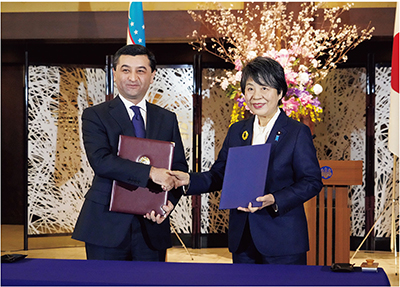Diplomatic Bluebook 2025
Chapter 2
Japan's Foreign Policy by Region
3 Countries in Central Asia and the Caucasus
(1) Overview
Countries in Central Asia and the Caucasus are situated in a location of geopolitical importance that connects East Asia, South Asia, the Middle East, Europe, and Russia, and have abundant natural resources such as oil, natural gas, uranium, and rare metals. The stability of the entire region, including Central Asia and the Caucasus, has also been of great importance in addressing key issues facing the international community such as the fight against terrorism and counternarcotics.
In the wake of Russia's aggression against Ukraine that began in 2022, Central Asian and Caucasian countries that have close geopolitical and economic ties with Russia have each been forced to take a cautious approach. The countries of Central Asia and the Caucasus have been absent from or abstained from voting on UN General Assembly resolutions related to the aggression against Ukraine, with the exception of Georgia, which has expressed support for Ukraine, and many countries have avoided making their positions clear externally. Meanwhile, at opportunities such as the Foreign Minister's Meetings of the “Central Asia plus Japan” Dialogue and other various opportunities, Japan and the five Central Asian countries concurred on the importance of upholding the UN Charter and other international laws, which includes respecting the independence, sovereignty, and territorial integrity of all countries and peacefully settling disputes.
Japan and the Central Asian and Caucasian countries have traditionally maintained friendly relations. Japan is strengthening bilateral relations with these countries through high-level dialogues, including the framework of the “Central Asia plus Japan” Dialogue, which marked its 20th anniversary in 2024, as it continues efforts to promote regional cooperation.
In addition, in light of the current international situation, the importance of the “Caspian Sea Route,” a transportation route linking Central Asia and Europe via the Caucasus region without passing through Russia, is attracting increasing attention from Central Asian and Caucasian countries as well as Western countries. Japan is also focusing on strengthening connectivity in the region and promoting economic cooperation, including facilitating logistics by speeding up customs clearance.
(2) Central Asian Countries
The countries of Central Asia are partners of Japan in maintaining and strengthening a free and open international order, and Japan is promoting diplomacy aimed at contributing to peace and stability in Central Asia.
Japan launched the framework of the “Central Asia plus Japan” Dialogue in 2004, and has held nine Foreign Ministers' Meetings as well as various discussions with the participation of experts and business people. In recent years, the international community has shown increasing interest in strengthening relations with Central Asian countries, and many countries such as the U.S., the EU, the Gulf Cooperation Council (GCC), China, Russia, India, and Germany have held summit meetings with Central Asian countries. Japan will also utilize the framework of the “Central Asia plus Japan” Dialogue, which celebrated its 20th anniversary in 2024, to strengthen its relations with Central Asia through high-level dialogues and other means.
 Illustration commemorating the 20th anniversary of the “Central Asia plus Japan” Dialogue ©MORI Kaoru
Illustration commemorating the 20th anniversary of the “Central Asia plus Japan” Dialogue ©MORI KaoruIn June, State Minister for Foreign Affairs TSUJI Kiyoto visited the Kyrgyz Republic and Tajikistan, while also stopping in Uzbekistan and Kazakhstan.
Furthermore, Prime Minister Kishida held telephone calls with the leaders of the five Central Asian countries in August, and Foreign Minister Iwaya held telephone calls with the foreign ministers of the five Central Asian countries in November.
Regarding relations with Uzbekistan, Foreign Minister Bakhtiyor Saidov visited Japan in March as a guest of MOFA to attend a Foreign Ministers' Meeting with Foreign Minister Kamikawa, and the two foreign ministers shared the intention to foster concrete bilateral cooperation at multiple levels. In June, State Minister for Foreign Affairs Tsuji visited the country and met with Deputy Minister of Foreign Affairs Bobur Usmanov.
 Japan-Uzbekistan Foreign Ministers' Meeting (March 8, Tokyo)
Japan-Uzbekistan Foreign Ministers' Meeting (March 8, Tokyo)Regarding relations with Kazakhstan, State Minister for Foreign Affairs Tsuji met with Deputy Mayor of Almaty Nusupova during his visit to the country in June. Parliamentary Vice-Minister Fukazawa visited the capital, Astana, to attend the 30th anniversary commemoration of the International Science and Technology Center (ISTC), and held discussions with First Deputy Minister of Foreign Affairs Akan Rakhmetulin and Minister of Science and Higher Education Sayasat Nurbek on deepening cooperation between the two countries in all areas, including science and technology, sports, and energy. In May, Deputy Minister of Foreign Affairs Nazira Nurbayeva visited Japan and confirmed that Japan and Kazakhstan, the current chair of the “Central Asia plus Japan” Dialogue, would cooperate on further coordination of “Central Asia plus Japan” Dialogues and summit meetings.
Regarding relations with the Kyrgyz Republic, State Minister for Foreign Affairs Tsuji visited the country in June, paid a courtesy call on President Sadyr Japarov, and exchanged views with relevant parties regarding cooperation in areas such as the sending and receiving of human resources, including highly skilled personnel, clean energy, logistics, and transportation infrastructure. Additionally, during his visit to Japan in September, Minister of Energy Taalaibek Omukeevich Iblaev met with Minister of Economy, Trade and Industry SAITO Ken and exchanged views on bilateral cooperation concerning economics and energy.
Regarding relations with Tajikistan, State Minister for Foreign Affairs Tsuji visited Tajikistan in June and paid courtesy calls on Deputy Prime Minister Usmonali Usmonzoda and Minister of Foreign Affairs Sirojiddin Muhriddin, and exchanged views on issues including the utilization of Tajikistan's labor and human resources, strengthening cooperation toward holding the Summit Meeting of “Central Asia plus Japan” Dialogue in 2024, and cooperation in the international arena. A ceremony was also held to present football uniforms to the Tajikistan Football Federation.
Regarding relations with Turkmenistan, Foreign Minister Kamikawa met with Deputy Prime Minister and Minister of Foreign Affairs Rashid Meredov, who visited Japan in January, and signed the Cooperation Program between the Ministry of Foreign Affairs of Japan and the Ministry of Foreign Affairs of Turkmenistan for 2024-2026. In February, Speaker of the House of Representatives NUKAGA Fukushiro held talks with Chairpeson of the Parliament Dunyagozel Gurmanova during her visit to Japan. In March, Minister of Trade and Foreign Economic Relations Begench Gochmollayev visited Japan, met with relevant parties, and attended the Turkmenistan-Japan Business Forum. A new Japan-Turkmenistan tax convention was signed at the 15th Joint Meeting of the Turkmen-Japanese and Japan-Turkmen Committees on Economic Cooperation, held in Ashgabat in December.
In recent years, there has also been a growing movement among Central Asian countries and neighboring countries to promote regional cooperation. In 2023, there were a number of meetings attended by the leaders of Central Asian countries, including a Shanghai Cooperation Organization (SCO) summit meeting (July), a Commonwealth of Independent States (CIS) summit meeting (October), a meeting of the Organization of Turkic States (November), a Collective Security Treaty Organization (CSTO) summit meeting (November), and a Eurasian Economic Union (EAEU)summit meeting (December). Among the Central Asian countries, the fifth meeting of the Central Asian Leaders Summit took place in Tajikistan in September.
(3) Caucasus Countries
The Caucasus region has a potential to be a gateway connecting Asia, Europe and the Middle East, and geopolitical importance that directly affects the peace and stability of the international community. Meanwhile, problems exist in Georgia over South Ossetia and Abkhazia, and Azerbaijan and Armenia have long been at odds over Nagorno-Karabakh and other issues. Japan announced the Caucasus Initiative in 2018, which is comprised of two pillars: (a) assistance for human resources development for state building (human resources development) and (b) assistance for paving the way to “Appealing Caucasus” (infrastructure development and business environment improvement), develops its diplomacy in line with this initiative.
Regarding the Nagorno-Karabakh issue, Japan has strongly urged all parties to peacefully resolve issues involving the region through dialogue. Peace negotiations and consultations toward border delimitation have continued between Azerbaijan and Armenia since the military activities in September 2023, and at the eighth meeting of the State Commissions on the delimitation of the state border in April 2024, the two parties agreed to carry out border delimitation based on the Alma-Ata Declaration, which stipulates the recognition and respect of each other's territorial integrity. Based on the preliminary agreement reached at the same meeting, an agreement was reached with respect to part of the border between the two parties at the ninth meeting, held in May.
Regarding relations with Azerbaijan, Deputy Minister of Foreign Affairs Yalchin Rafiyev visited Japan in February and met with State Minister for Foreign Affairs Tsuge, and the two concurred on their countries working together to ensure the success of the 29th session of the Conference of the Parties to the United Nations Framework Convention on Climate Change (COP29) (November, Baku, Azerbaijan). Furthermore, Deputy Minister of Foreign Affairs Elnur Mammadov visited Japan in May and held a discussion with Parliamentary Vice-Minister for Foreign Affairs Fukazawa on cooperation between Japan and Azerbaijan in various fields.
Regarding relations with Armenia, in September, State Minister for Foreign Affairs Tsuge met with Secretary of the Security Council Armen Grigoryan, who was visiting Japan, and welcomed Armenia's participation in the Expo 2025 Osaka, Kansai, Japan. He also confirmed that through participation in the Expo, the two countries will further deepen bilateral relations, including strengthening and promoting economic relations, and continue close cooperation between the two countries in various fields.
As for relations with Georgia, in May, Parliamentary Vice-Minister for Foreign Affairs Fukazawa met with Deputy Minister of Foreign Affairs Alexander Khvtisiashvili, who was visiting Japan for a round of political consultations between the two countries and exchanged views on cooperation in various fields. He also conveyed his congratulations on the opening of the Honorary Consulate of Georgia in Kagoshima in the same month. In the Georgian parliamentary elections held in October, the ruling party “Georgian Dream” won more than half of the seats, but opposition parties did not recognize the election results, claiming there was electoral fraud, and held protests calling for the election to be rerun. In addition, the announcement by the Georgian government at the end of November that it would not start the EU membership process until the end of 2028 led to large-scale protests by citizens supporting EU membership, resulting in many arrests and injuries due to clashes with security forces. In response, Ministry of Foreign Affairs spokesperson issued a statement expressing concern over the situation and calling on the Georgian government to exercise restraint in order to avoid further deterioration and to take constructive measures that will gain the understanding of the Georgian people, as well as expressing its hope that the situation will be calmed down soon.
